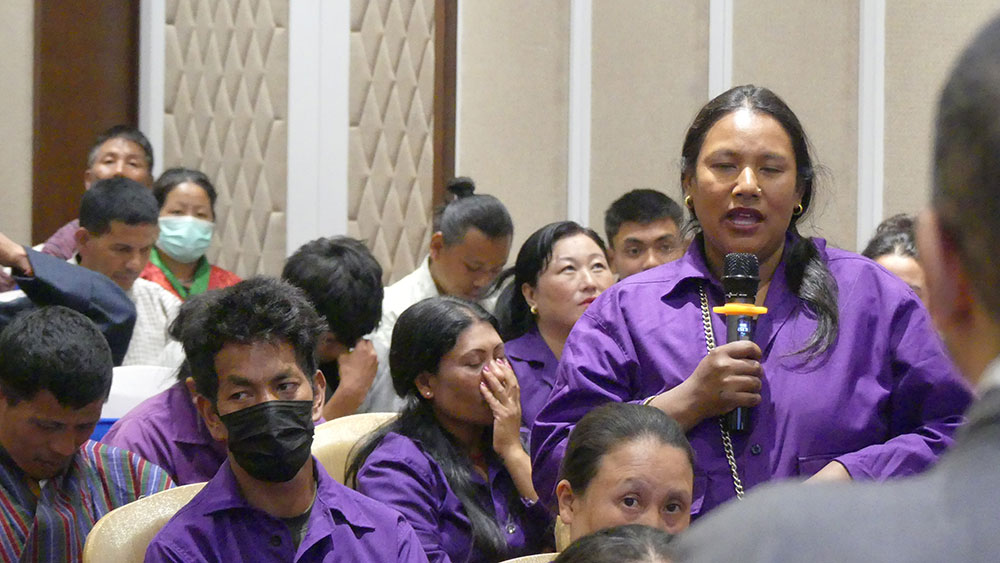YK Poudel
As you drive past people toiling by the roadside, how you view them means the world to them. Are they nameless and faceless menial workers or an essential workforce keeping the city clean and hygienic?
This is what came to light as 100 waste pickers from Thimphu Thromde and other agencies gathered in Thimphu on June 17 to observe the ‘Global Garbage Man Day’.
While many respect waste pickers and offer them water, juice or kind words of encouragement, some yell at them rudely. A remark can be as extremely dehumanising as this: “Drink the water from the drains you work in.”
If what blocks drains and sewerage lines reflects how waste is treated, the capital city’s residents need to be educated on waste management.
Manita Gurung, a city worker from Babesa, said people are often aggressive towards city workers. “A behavioural change is required to ensure that the workers feel secure and motivated,” she said.
She added that people often dispose of waste in places where it is difficult or impossible to retrieve it, making waste pickers helpless. She has seen mostly shopkeepers, restaurant owners, and drivers making unhygienic waste disposal, putting waste pickers’ health and wellbeing at risk.
Manita Gurung said working with untreated waste is a health risk, adding that thromde workers are not well-equipped with enough safety gear to deal with all sorts of waste.
Lhasang Tamang, a city worker who attended the garbage man’s day, said that degradable waste carelessly thrown around in plastic bags becomes unhygienic with a pungent smell.
Pet bottles, plastic, old clothes, glass bottles, sand, and dirt are the most common non-degradable waste clogging drains.
Adding to this are construction sites littered with plastic and construction materials. Most septic tanks are connected to drains and are often blocked.
Lhasang said the monsoon makes the situation worse as the surface runoff water scatter all sorts of waste everywhere.
As part of the event, waste pickers, youth volunteers, scrap dealers, and sanitary inspectors of Thimphu Thromde participated in a panel discussion.
The discussion called for solutions such as an increased number of dustbins for different kinds of waste, support for waste pickers and waste management agencies, and behavioural change.
Namgay Wangchuk, the founder of a Facebook group called Trashnology Toppers, said that many people voluntarily pick up trash despite mounting trash. “A person managing waste is superior to an uneducated person who throws it,” he said.
Dorji Khando, a city worker for over 17 years, highlighted the need for social and personal safety protections for people in the waste industry to elevate it to a sector with real economic opportunities.
“Most waste can be recycled, yet it’s the negligence and waste not being considered attractive that prevent people from managing it well,” he said.
He added that it was time to make the waste management strategy attractive and doable. A hefty fine and behavioural change, he said, are necessary to change things.
Dorji Khando said increasing the number of dustbins at strategic locations with designated individuals to monitor them would improve things.
The sanitary inspector of Thimphu Thromde’s environment division, Ugyen Yangzom, said that the thromde has been penalising building owners who do not manage their construction waste properly.
“Everyone is encouraged to use the Zero Waste Bhutan app and report when they see someone making illegal waste disposal,” she said.
The government’s Zero Waste Bhutan app tracks waste-related offences. So far, it has recorded 436 offences and 369 incidents of waste-related issues.
Thimphu Thromde waste collection vehicles separate waste into categories like wet, dry, and hazardous. Ugyen Yangzom said that segregation of waste has improved over the years with members of public adhering to it strictly.
According to the National Waste Inventory Survey of 2019, Bhutan produces 172.16 metric tonnes of solid waste every day.
A recent study found that women comprise 75.51 percent of the waste management sector.
A study by the National Commission for Women and Children revealed that the majority of waste pickers in Bhutan are women.
The Global Garbage Day was established in 1988 by Bob Gordon, a sanitation worker from New York.
The day was organised by the Bhutan Ecological Society and Gross International Nature as part of the “Reimagining Effective Partnerships for Tackling Plastic Waste and River Pollution” project under the Plastic Free Rivers and Seas for South Asia initiative funded by the World Bank and other implementing agencies.


